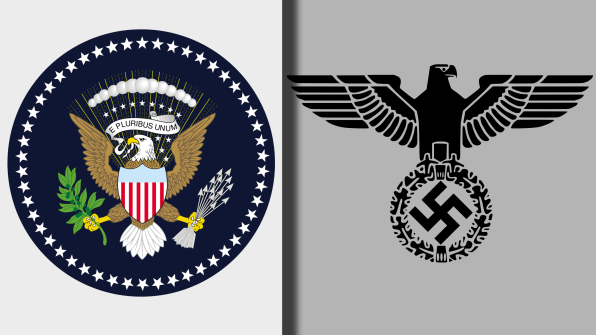Dmitry Orlov:
"...The final stage of cultural collapse is where people stop looking like people, stop resembling people: they become more like animals. And that’s the final stage of collapse, after which you don’t really have anything you could call humanity any more. You just basically have these semi-feral humans running around. I’ve even done one case study of a society that reached that point, where esteemed scholars, anthropologists – one anthropologist in particular – decided that such societies should be completely disbanded: the individuals have no business being together. They have to be broken apart, split apart, because at that point what culture remains is pathological.
Now the United States, it turns out, is following this collapse sequence backwards. This is a realization that I had quite recently: [the US] started with cultural collapse.
Basically, the process that has been unfolding in the United States since the late 50s and throughout the 60s has dismembered extended families, and then later on destroyed nuclear families as well, so that out of wedlock births are now quite dominant and the number of children, especially in black families, who grow up fatherless is staggeringly huge. That basically indicates that the culture has failed. There is no longer a real human culture; there’s just a commercial culture of consumerism. Consumers, who pay attention to prosumers and influencers and media. The only function they have is deciding what to consume until the money runs out, at which point they’re just basically cut loose – completely cut loose, cut adrift.
Society doesn’t really have any viable functions any more. In some places the church is still dominant and plays a large role, but that is really the only strong social function that exists.
[Regarding] government, we can see huge dysfunction in the political sphere. Basically, the entire country is splitting up into red and blue zones which are more or less at war with each other already, although it’s not a shooting war in a lot of places yet, but it could very well evolve into one.
Commerce has devolved to a point where the United States is not self-sufficient in most manufactured products, and most of what it produces is ephemera like software and media, and maybe some pharmaceuticals that are incredibly over-priced; and a lot of agricultural products. So it’s basically like a plantation economy as far as the world is concerned. It no longer has a viable industrial sector.
And then financially it’s basically a black hole, because what it does is it prints money. It lends it out mostly to insiders. There’s no expectation that these debts that are generated will ever be repaid, and eventually these debts are converted into weird zombie financial instruments that sit on the books of weird zombie companies that are forever kept out of bankruptcy by printing money again and lending it out. So there’s no pretense any more that finance has anything to do with actually estimating risk and deciding when to lend based on the projected ability to repay, because it’s not expected that anybody at any level will ever repay anything.
So it’s just the printing press running loose, and the entire economy of the United States now depends on that printing press. The moment it turns out that printing one more dollar doesn’t produce any value at all but actually produces negative value to the economy it’s pretty much over, the whole game is over.
When that will happen is very difficult to time but it’s going to be an event; it’s not going to be a process. One day people will wake up and realize that the Federal Reserve printing another hundred trillion dollars is not going to move the economy forward one inch, and it is at that point that the whole thing will be declared over.
So that’s what I’m seeing happening now...."
*
"...there are still large areas – mostly rural at this point – where the older sort of stratum of Anglo-German society holds together, and so it may be that there are large swaths of land patrolled by heavily armed locals that are still relatively safe and relatively productive. The question is will they be able to actually survive without access to the coasts and to the ports, because the United States no longer produces the spare parts it needs to keep plant and equipment running. All of that stuff is imported now, mostly from China, and so there’s no reason to expect that the United States will be able to re-industrialize under these conditions because the [country lacks the] core competencies needed to re-industrialize. The engineers no longer exist; they all went to law and finance a long time ago, and other professions that basically have to do with people swindling each other, so there’s no reason to expect that sort of a rebirth.
As far as the cities [are concerned], it’s really unclear what function they serve. The coronavirus shutdowns have proven that cities at this point don’t serve any vital function at all. They could just be disbanded. They could be abandoned. So it’s really hard to see what new cohesive thing could emerge from this process."
*
"The fact that the United States has troops stationed all over the place, and the fact that it outspends everyone in dollar terms is neither here nor there: it just doesn’t mean anything because [the US] is not really capable of it any more. Look what happened when the Iranians responded to the murder of one of their generals by the Americans by just blasting rockets at a couple of military bases in Iraq: nothing. There was no response. The Americans just took it.
That’s been the pattern that’s been established for a long time. The Americans get into harm’s way but then they don’t do anything. They haven’t had a military success pretty much forever. The entire military establishment in the US is basically a money sponge: it’s very expensive but it’s not very good. Their planes don’t fly very well and there are a lot of issues with just about every part of it. The objective is not to defend the nation, because nobody is attacking the nation. The objective is to basically absorb as much money as possible and distribute it amongst a small group of insiders.
So if you look at defense spending parity between, say, Russia and the United States, Russia gets ten times more for each dollar spent than the United States, so the Russian military has been growing stronger and Russia has been cutting its defense spending the entire time, while the United States has been growing weaker and keeps increasing its military spending. Those trends are unmistakable. So the idea that the US is still a global hegemon based on its military prowess is, I think, entirely misguided.
I think the only thing that keeps the United States in the news around the world at this point is the Federal Reserve printing press and the US dollar. That’s it. Nothing else."
*
"...people get by pretty well provided they can make themselves useful to each other. Not within some scheme where you go on some job board and look for an employer because those [jobs] will be pretty thin on the ground, I expect. But what you can do yourself for your immediate neighbors, for people you can make contact with. And a lot of those skills are pretty basic.
So in the more promising places in the world - promising from the point of view of surviving what’s coming – people cultivate these habits, so for instance there’s no conceivable reason that in Russia right now I should be growing potatoes…except I am, and so are most other people. It’s one of those things that you never want to stop being able to do, like there’s no question that you will abandon your ability to grow potatoes even though I could drive to the supermarket and buy all the potatoes I could ever want, and more, for not very much money. It’s not about that. Similarly, people know how to build log cabins; people know how to put stoves together out of brick. You know, there’s a myriad things like that that people know how to do. They will keep old cars running because they can be repaired using hand tools without hooking them up to a computer. There are lots and lots of adaptations like that that people around the world cultivate in order to prepare for hard times because they know from their experience that the hard times are coming. They know that. It’s not a question of whether, it’s a question of when. Nobody knows when, and so the time to practice is now.
Now there are people in the West who think that the gravy train they’ve been on will go on forever, and that’s not a fact, that’s not true. So there are a lot of humble occupations that people could start learning for, in order to make themselves useful when the time comes."
https://m.facebook.com/story.php?story_ ... 0000104830





